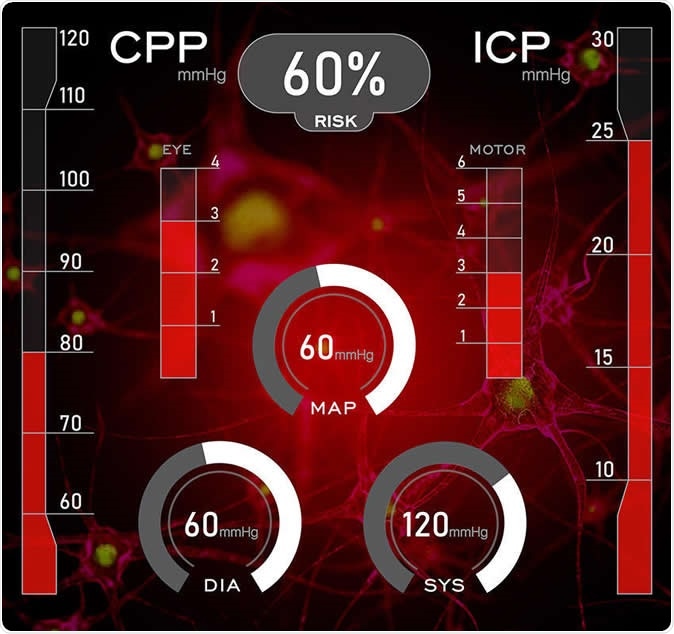A new study from Helsinki University, published in the journal Scientific Reports on November 27, 2019, shows the application of an artificial intelligence (AI) algorithm to predict the risk of acute death following severe traumatic brain injury (TBI).

An artist’s illustration of modern neurosurgical intensive care and the use of machine learning algorithms. Credit: Rahul Raj, University of Helsinki
Traumatic brain injury
TBI is the term used for sudden brain damage caused by a sudden impact to the brain, usually against the hard bone of the surrounding skull, but also directly in cases of fractures of the skull. Penetrating skull injuries can also cause TBI.
TBI causes a lot of sickness and death around the world, with the greatest impact being in low- and middle-income countries. The rate of TBI is on the rise. Severe TBI need intensive care in ICUs but despite the best of care, only two out of three patients survive.
Patient monitoring in TBI
Severe TBI typically results in unconsciousness, a feature that makes it difficult to monitor the patient during this acute phase of injury when intensive care is required. At this time, many parameters need to be controlled, including the mean arterial pressure, the pressure inside the skull, and the cerebral perfusion pressure. All these are important sources of information on the patient’s condition.
At the same time, a single parameter such as the cerebral perfusion pressure, for instance, may be measured with a daily frequency that falls within the hundreds of thousands. This kind of information is too much for the brain to comprehend. However, it is ideal for computational processes.
AI algorithms and patient mortality
Taking advantage of this fact, the researchers designed algorithms based on machine learning, that may help doctors understand the true picture in severe TBI better, to decide on the appropriate treatment for the individual patient at that point. If it works as designed, this type of algorithm could even predict the outcome, including the objective facts and expected prognosis, as well as changing the prediction based on the treatment-induced alterations.
For instance, the model can tell doctors how likely the patient is to die within 30 days, and the prediction is accurate in 80% to 85% of cases.
The study reports two separate algorithms, one slightly simpler than the other. The first one requires 3 input variables, derived from monitor data. The second is based on 5 variables, including level of consciousness as decided based on the Glasgow Coma Scale score, a popularly used measurement tool. While the second is, not surprisingly, a little more accurate than the first due to the more comprehensive nature of the assessment, both are quite good at outcome prediction in patients with severe TBI.
Implications
The dynamic prognosis capability is unique to this model, say the researchers. One of them, Rahul Raj, says, “Although this is a proof-of-concept and it will still take some time before we can implement algorithms like this into daily clinical practice, our study reflects how and into what direction modern intensive care is evolving.”
The algorithms will need to be tested both in national and then international sets of patient datasets, to validate their assessment capabilities. They stand witness to the useful contribution that AI can make to healthcare. Finland is a frontrunner in this area, and the researchers at Helsinki University, from where this study comes, think it important to be ethical about the work they do, by making it open-access so that others can work on it and advance it to the point of clinical application in as short a time as possible, with the maximum cost-effectiveness and accuracy.
Journal reference:
Raj, R., Luostarinen, T., Pursiainen, E. et al. Machine learning-based dynamic mortality prediction after traumatic brain injury. Sci Rep 9, 17672 (2019) doi:10.1038/s41598-019-53889-6, https://www.nature.com/articles/s41598-019-53889-6